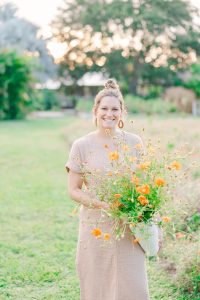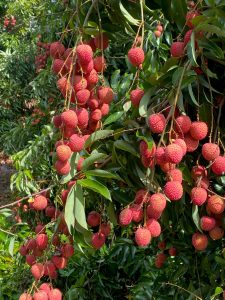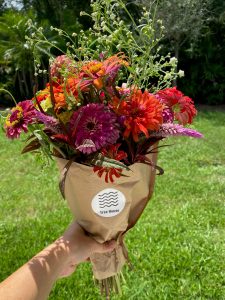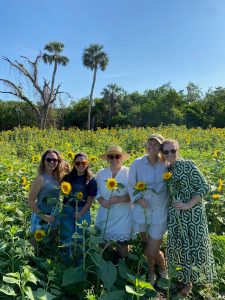November is a time for giving thanks and, of course, for eating delicious food. That makes it the perfect time to recognize and celebrate all our local farmers, who work tirelessly to ensure that we can put food on our tables.
We’re excited to share the first installment of our “Interview with a Farmer Series”, where we talk to some of our local Indian River County farmers and producers to learn more about their operations, what it’s like to be a farmer, and what we can do as consumers to support local agriculture.

If you’ve ever wondered about the people behind your food, you’re in for a treat as we uncover the heart and soul of local agriculture in Indian River County. Join us for a new post each week throughout the month of November. In this first post, we hear from Pam Hund of Tree House Vero Beach…
Can you tell me a little bit about your farm or operation?
Tree House Vero Beach is a small, family farming operation. The main farmers are my dad, Wayne Sommers, my husband, Jake Hund, and me, Pam Sommers Hund. We grow lychees, palm trees, and have a cut flower farm. Our lychee fruits are harvested for wholesale distribution to local farmers markets and restaurants. We have a variety of field grown palms that are also wholesale to local landscapers. Recently I introduced cut flowers to the farm. The cut flower farm has been an exciting opportunity to share my love of growing with our community. We invite participants to learn about growing flowers, help harvest, and arrange beautiful farm to table bouquets. Everything we grow is organic, sustainable, and ethically produced.
How did you get started in farming?
My dad purchased an old citrus grove in 1999. The citrus trees weren’t viable anymore, so he replaced the grove with lychee trees. Lychees are a tropical fruit originally from southern China & southeast Asia. They grow best in subtropical climates, but I’d say Vero Beach is about the line. Throughout the years we’ve lost some trees to the frosts and filled in with growing palm trees, too. I’ve always loved gardening, being outdoors, and was recruited right from the start to help with farming chores. I’d spend my high school weekends pulling weeds & planting trees. I farmed vegetables and flowers for years as a hobby. In 2020 I quit my corporate job and joined the farming team full time. I have since expanded our family farm operation to include cut flowers & agritourism. It’s important to me to have a lifestyle that enables me to pursue my passions & spend time in nature.

In your opinion, what is the best or most rewarding part of your job? What is the most challenging part of your job?
The most rewarding part of my job is accomplishing hard work. When you finish a hard task, you are rewarded with an intrinsic sense of accomplishment and pride in your work – that’s the day-to-day feel-good stuff. It’s amazing to see the abundance of a harvest or the results of a good growing season, but that doesn’t always happen. Sometimes you work for days, weeks, or years only for it not to result in anything. The most challenging part is the hard work part. Farming is mostly NOT easy. It requires heavy manual labor, being outside in the elements (which are usually SO hot), and getting very dirty and uncomfortable. There is never enough time or hands to help.
What is something you wish more people understood about farming?

Farming is a labor of love, but it’s not easy. Farming is expensive. People take things for granted because they are accustomed to being able to buy a beautifully packaged product without thinking about where it came from. I think what we eat, purchase, and bring into our homes should be grown ethically and sourced as local as possible. Farmers want to share their bounty with you – if you feel the price is too high, it is not because the farmer wants to take advantage of the buyer; rather, it’s because good quality, locally grown products take so many resources – financially & timewise.
What is something easy that people can do to help support local agriculture?
Shop local. Go to farm stands, farmers markets, roadside stands, join community gardens, visit farms, teach yourself and your children where food comes from. In the grocery store, always look at the label to see where the item came from. Look for the “Fresh from Florida” label. Try to buy produce that is in season. The other day, I looked at a navel orange to buy from Publix and it was from South Africa. I imagined the orange getting picked, washed, sorted, packaged, sent across the ocean, transported to the grocery store, sitting in the back, finally making its way to the display case, and wondered “how old is this orange?”
What does a typical day look like?

Each day is different, which keeps it interesting! Here are some examples: last week we put in a new bed for cut flowers. I amended the soil with natural supplements, laid drip line in a pattern to make rows, and put black landscape mat on top of that. Then I use a small torch to burn holes in the black landscape mat where our plants will grow. Each hole gets direct sow seeds in it so that the flowers we want won’t get covered up with weeds. On top of farming, I also do a lot of administrative work like advertising, marketing, website maintenance, customer relations, and finances. For the palm & lychee trees that are more mature there is a lot of maintenance – trimming branches, fertilizing, fixing irrigation, etc.
Is there anything else you’d like to share?
We would love to welcome you to our farm! Agritourism is a big part of what we do, and we love educating the community about farming. Check out programs, workshops, & offerings at our website: www.treehouseverobeach.com.
 5
5
